|

Warmer temperatures bring foraging bees.
(*photo credit)
April 1, 2013 Reclaimers Counter Climate Change Deniers
The heat, cold, ocean rising, etc. is a natural phenomenon!
Sorry, April Fool's joke!
I would like to believe this April Fool's trick is humorous, but the life of a planet is at stake. One Florida businessman offered to take care of all our financial problems this year if I said that climate change is naturally caused and capitalism is the most perfect economic system. He found it incomprehensible that I would not accept his largess by such simple affirmations. However, we do not live in a world of fiction as do many who still defend the status quo. Wake up! The planet is being threatened.
How do you cope with apparently permanent deniers who would have their world upset if they were to accept that human beings cause the impending catastrophe? It would mean that we are at fault and need to confess it. The Big Energy merchants of doubt can con status-quo seekers so easily. These are the ones who wrap their materialistic piety into their religious assertions and regard all as one and untouchable. This permits the privileged few to distance themselves from the real world. For the, why worry for God will clean up the ecological mess, like maids do their rooms? These regard their lifestyles as so envied by the hoi polloi that they must be doing godly things, if so many want to imitate them.
Climate deniers deny their hidden fears. Underneath the facade, deniers have the deep fear that they may be wrong. I do not share that fear as one accepting the scientific basis for human caused climate change. In fact, I would love to be wrong, for the fictitious world would be a better world to look forward to. This difference between deniers and affirmers of human-caused climate change is most telling; it is a vast chasm between outlooks: namely, fearing to be wrong versus wishing to be wrong. The difference is stark, but it forces us to address fears that change the way people think. Our response is a call for prudence in all matters; we must take the safer course.
Climate deniers deny their addictions. We are all addicted to consumer products to some degree. We are more familiar with smokers or those on drugs who refuse to quit, and we wince knowing that their lives are being shortened. The virtue of prudence tells us that we must not act in a reckless manner, like teenagers on a speeding joy ride. However, consumer addiction involves all of us, and we are all hurting because of it. The first step to overcoming this addiction is to recognize it and admit our condition -- and here faith-based groups can play a major role. The deniers are also the defenders of their own economic privileges and the system that currently lets them get away with "murder" of our planet. Unchallenged, this sort of denial breeds further denial.
Prayer: Lord, teach us to see ourselves for what we are, people able to face our fears and our addictions and act accordingly through divine help.

The "fiddlehead" of an unfurled fern.
(*photo credit)
April 2, 2013 The Quagmire and the Battle between Good and Evil
Three hundred years ago April Fools was a two-day event and involved "hunting the gowk." Yes, those were simpler times. We are in another era when the foolishness of climate change denial (yesterday's topic) should be taken in all its seriousness. We do not have time to play games and so when we think of how to launch reflections this Eastertide we need to move beyond April foolishness and talk meaningfully to climate-change affirmers.
The times are serious and it penetrates all our lives. I had a horrible nightmare though in bright daylight: it was that of a cataclysmic struggle between good and evil. The picture is really what Saint Ignatius and other spiritual writers paint about the gigantic struggle of Christ and personified evil, the devil. St. Ignatius takes this up as the "Meditation on Two Standards." Without digressing too much at this moment when the fate of the planet lies at stake, we hark back to the glory of untouched nature and find the continence of Christ looking up to us from every creature. On the other side we see the field with enticing resources of riches, honors, and pride.
The frightening aspect is the reality of the battle that few wish to express or talk about in any serious manner, the armies of spiritual virtue and evil crass materialism. In the nightmare, virtually the whole world embraces large-scale capitalism with its wealth overwhelming people to the point where they would not let go of all their earning power, insurance policies, nest egg securities, buying and selling power, and taxes and gifts given and received. The material evil is so widespread that it paralyzes doers of good and pulls them down into the cesspools of material quagmire and resulting pollution and waste.
The cataclysmic scene becomes almost unthinkable. Evil is so pervasive with all its technicalities, practicalities, and popularities that the great denial is not that there is a God but that there is a devil, evil personified. Confession is ignored because each person is relatively right in what he or she does. It is against the law to talk about morality, since each has a sovereign right to hold anything and the majority holds that evil does not exist; materialism is supreme in every land. Good people sink into the muck and the suction is the magnetism of evil.
In desperation, we cry out, "God help us, remove such thoughts from our mind." In the heat of conflict we may find it difficult to listen to the divine response. This is a grace-laden moment, a time to be aware of more than tendinitis when imaginary crickets chirp. The sun is shining, flowers are uplifting, and birds sing. The Lord has risen and we are empowered, no matter how bleak the seeming powers of darkness. So evil is present, but all the greater are the powers of good -- if we but believe.
Prayer: Lord, teach us to be Easter people, to see the real struggle before us, and yet to rise to the occasion with faith.
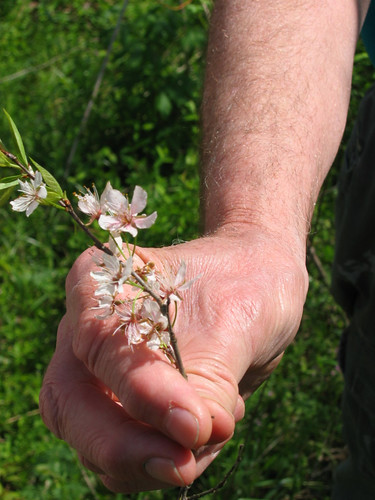
Fresh spring blossoms of the wild plum.
(*photo credit)
April 3, 2013 Focusing on Cardinal or Theological Virtues
We spend time with reflections titles in order to trigger search engines to alert the public in a proper manner. The Cardinal Virtues are from ancient Greek philosophical times: prudence, justice, fortitude, and temperance. In Christian times these are called "theological virtues," and much has been written about them in both philosophical and spiritual literature. Make a Google search! The virtue names are clear enough: for temperance the moderate use of good things; prudence, when and how to act; justice, giving others what is due; and courage, the willingness to act at a given time, even with accompanying risks. All are operative, but some have periods of greater focus or emphasis.
Temperance strikes us early in environmental work, for we are surrounded by the HERE of good things to choose from and in what degree of moderation, especially when they are so enticing. If one has a problem with extra intake of food or drink at a given time, then focus on temperance or, if too difficult, on total abstinence. Temperance calls for resource conservation in times of excessive pollution and waste. My book, The Contrasumers, dealt with resource conservation in an age of wasteful consumption (of the early 1970s), but this work, while operative, is limited to a more elementary environmental age. However, Chapter Six on "Radical Environmentalism" is well worth some revision and updating.
Prudence is that way of acting in times of decision, the NOW. In fact, we are at this moment of utter urgency to act in ways to save our wounded Earth. Silence of the fearful must be exposed and seen for what it is. Prudence involves the moments when our choice must be balanced to the need to focus limited resources on the massive mission ahead of us, and realizing that we can only do so much. Prudence overcomes impulsive action, but also allows for proper awareness of what can be done amid our limitations.
Justice is certainly the ultimate goal (so often assumed) in the work we are doing to bring about the Kingdom of God. It is not only the justice between local neighbors or the giving of a living wage to a helping hand, but it has ecological elements and is social as well, embracing larger and larger neighborhoods. In one sense, this is the WE that we speak about and in which we find ourselves lacking when striving to reach our goal.
Courage, no doubt, is needed in these times since the temptation to be silent or to go with the crowd is so very great. Why rock the boat in the middle of a storm? Every time we speak, we run the risk that others will immediately characterize our words or actions as improper or beyond the pale. Our first impulse is to strike out recklessly, but we overcome this for a greater good. To do the less dramatic but nobly needed action takes boldness and courage -- just as we dare to say "Our Father."
Prayer: Lord, give us the grace to focus on all virtues but especially those needed at a given time and place.

Pollinator finds the cutleaf toothwort, Dentaria laciniata.
(*photo credit)
April 4, 2013 Soft or Gentle Hard Approaches to Climate Change
Several years back on October 8-12, 2007 we spoke of hard and soft approaches to lifestyle changes with these comforting and hard-nosed statements: We can save our Earth if we change our ways... or We cannot save our Earth unless we change our ways.
Urgency of time, audience need, and pressure from within the messengers themselves all add up to dictate choice of approaches. A "YouTube" clip circulating by an old acquaintance, Michael Dowd, who I knew when he was a full-blown, creation-centered champion, now appears with deep concern and demands that the audience take up the climate-change issue at once in order to save our planet. Amen! Michael and his wife's message move the distracted or unconcerned to a greater sense of urgency, but is it reaching everyone? Is the situation even more serious than they announce? Methane leakage in natural gas extraction (as well as soot) could be far worse climate-change hastening ingredients than indicated by the video -- partial remedies are available.
Is vacillation proper? If I were to characterize my life, I would place it in the period of early urgency when the need to undertake environmental work was strong, then the long period of soft approach in which urgency was translated in precious time to change one's way. Lifestyle simplification was important and ways to bring about change seemed within reach if we just took the time. Choices of approach are critical, for to be "turned off" is of little avail; to be "turned on" in wrong ways is even worse, for actions can spin out of control. Our sensitivity to people and where they come from makes us reluctant to over-emphasize solely either approach, and yet there are times and places for each.
Are our efforts limited? Do we want ideologues who seek to convert others through the hard approach? An entire decade based on a combination of soft and hard approaches requires a sympathetic understanding that people can only hear so much of catastrophe -- and sanity requires that people on occasion lighten up with a positively soft approach. If our reflections target a new salad it is because we have to eat something; if we talk about gardening it means we must get outdoors in full spectrum sunlight and fresh air to preserve sanity; if we talk about conservation or plans, then we affirm that is part of a domestic life.
Are addicted people able to save our wounded Earth? If we think we can stimulate others through our self-righteous higher elite position we are sadly mistaken, for they simply back away. A rational approach is limited. If we show that we are all party to social addiction and must act together then some movement of solidarity may result. Together the road to recovery is possible -- but this is a gentle but hard approach. Our nation is addicted to fossil fuels and a fracking boom complicates this situation.
Prayer: Lord, help us see that it is a gentle hard approach
called for today so that tomorrow we will find spiritual riches.
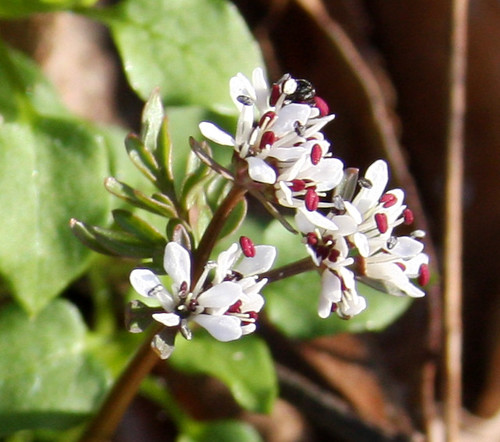
Finally - spring! Harbinger of spring, Erigenia bulbosa.
(*photo credit)
April 5, 2013 Subtitling "Reclaiming the Commons"
I formed you and set you as a covenant of the people, a light for the nations. (Isaiah 42:6)
The development of the Reclaiming the Commons subtitle has taken more time than any previous, but complete titles are important; they ought to be succinct, up-to-date, descriptive, and available to search engines. This is a tall order, and so few titles or subtitles are perfect; they tend to stretch out longer with time. As with all iterations, drafts One and Two were titled Reclaiming the Commons and subtitles portrayed that the focal HERE-and-NOW is our wounded Earth:
2008 version -- "What Believers Can Do for Our Wounded Earth"
2009 version -- "Belief in the Future Can Save Our Wounded Earth"
The third draft in 2011 has been digitally available through Brassica Books with a subtitle that reflects our current focus, the urgency, and what WE as a community working together can do about it: 2011 draft subtitle -- "Taking What Is Rightly Ours." This fourth draft work-in-progress has evolved in the past two years; the emphasis changing from healers of a troubled Earth (taken as an amorphous set of believers or "people of faith") to involving the Church as instrument of change. Who are the WE? How do we act? What tools area available to meet current challenges?
The above Isaiah 42:6 passage (Revised New American Bible) is quoted by Jesus in the beginning of his public ministry in his home town synagogue. The Light for the Nations is exactly what Jesus IS and what he wants us to be. "Light" encompasses both illumination of darkness and a catalytic and photosynthetic effect on all parties (leaven, a biological catalyst, does not have that deeper Scriptural context). What is expected of us in this fourth iteration of the book is to be catalytic at a time of crisis, a process of coming to clarity, and something more than a local level activity; this involves all the nations -- a universal appeal.
However, while we enlighten, we must do more than call or expose; we must act here, now, with others, and boldly. This means the subtitle must imply the courage needed to undergo this action. The "Church," while unspecified, must be in the title as a service body, an instrument to assist with reclaiming. Perhaps the audience is more restricted but let's hope we reach the silent churchgoers who often hold us back by insisting on the status quo. If we were to bash Church it might be temporarily popular, but something which those who regard church as a family will not do. Rather, seeing Church as source of light for catalyzing action takes this out of a theoretical realm or a local or broader faith-based context and places it squarely as a work-in-progress to save our wounded Earth. This invites joint action.
Prayer: Lord, give us strength and resources to continue with this work -- RECLAIMING THE COMMONS: Challenging an enlightened Church to Act.

Bringing comfort to the spirit on a dark, April evening.
(*photo credit)
April 6, 2013 Creating a Firestorm
I have come to bring fire to the earth, and how I wish it were blazing already! (Luke 12:49)
As promised in the general remarks for April, we are starting to excerpt selections from the 2013 edition of Reclaiming the Commons that is right off the digital press (Brassica Books). From April to December we will focus on one chapter each month and spend additional time in the course of the month on themes found in the particular chapter. As a beginning we are taking sections dealing with the Introduction and Chapter One on Air as Commons.
Our Earth is in trouble. This observation has colored my environmental work for forty-three years and troubles seem to grow worse by the year. Can we do anything about it? For many years the actual answer lay just below the surface, but fear kept me from voicing it. In old age, when we have far less to lose, I muster the courage to voice it: the environmental solution does not involve tweaking a dysfunctional economic/political system, for that only extends the agony. The system cannot meet the changes facing humankind; it only rewards those who grab and discourages those who would like to share resources with others. This economic system is too outmoded for the crucial but delicate task at hand; another must be proposed and installed. Reclaiming the Commons says--
-----------------
Climate change is now a greater wake-up call than air or water pollution of three decades ago. Weather extremes become more frequent, oceans rise at 3.2 millimeters per year, carbon dioxide increases at 3% per year, glaciers melt at a rapid rate, and other omens of disaster are in the offing. The challenge is for all who are concerned about future viability of our planet to do something -- but what?...
1. Our Earth is being damaged by current practices.
Industrialized nations are reluctant to commit themselves to global change goals (China is opening one new coal-powered plant each week). The 3.2% annual increased CO2 in 2011 was matched in 2012, helping to make that year the highest in such emissions on record. In 20 years global carbon emissions from energy are up 48%.
Chapter One deals with natural beauty and the damage done by those who sequester and misuse common resources. Air pollution threatens human life and all life on this planet. Programs are required to curb fossil fuel consumption, recognize the human causes of climate change, and support benign renewable energy alternative applications.
------------------------
Prayer: Lord, teach us to attend to difficult things so that in the end we will have a better quality life for all on this
planet.

Gently relocating a frog from path of forest trail.
(*photo credit)
April 7, 2013 The Need for God's Mercy Today
Do not be afraid; it is I, the First and the Last; I am the Living One. (Rev. 1:17)
Easter is the time of God's mercy shown in many ways, from the disciples on the road to Emmaus, to women at the tomb, from a doubting Thomas to discouraged fishermen. God gently brings to faith the doubting Thomas, the one needing positive proof; and Jesus blesses all of us who do not have this tangible proof of his presence in our midst. We must believe.
The mercy of Christ empowers us amid our imperfect ways, but it also gives us hope that what is given can be transforming; this mercy allows us to practice godliness that grows as we perceive and express gratitude for all of God's gifts. We need God's mercy as a sign of being forgiven and empowered to go forth and assist others. Within the narratives today is the story of the institution of the Sacrament of Reconciliation, the hand of God within our family of the Church. In today's Gospel account Thomas is accepted even while he appears to lack faith in what the others tell him. Do we tolerate doubters in our midst and show the same mercy that God shows us? Thomas professes his deepest and most profound manner of belief and so ought we.
Where must we help extend God's mercy? Many are confused by the happenings that occur so rapidly and with the serious threats that come to our gentle Earth through the misdeeds of all who extract resources in callous ways. Those who pollute our commons raise our ire and strain our attempts at mercy. We have to come face to face with the need to be severe to stop such practices, and the need to show mercy to those who seek to reform their ways. Our mercy is tried by the ones who are merciless, but we hold open the merciful possibility that they will change their ways. We do not have to tolerate their continued abuses.
God speaks to us in blooming flowers. We find God's mercy in the breezes, the blooming tulips, the fresh green grass and unfolding tree leaves, the scramble of the squirrels, and the song of birds. Here in a springtime landscape, God tells us not to abandon the efforts we are making, for all creation yearns for the Lord. We determine our location; we feel our urge to act; we sense our individual limitations. We must come together as the spiritually poor in spirit. We must discover that we as poor in spirit need God's help, and that need seems to grow with each passing day. We can destroy our Earth without God's help and it is happening. We can only save our earth with God's help. This impoverishment confronts us and forces us to admit our social addictions. We the poor need God's mercy.
Prayer: Please Lord, let our mercy and love be manifested in seeing who we are as a poor and addicted people. Help us to accept this condition as a sharing with others, not seeing them in need, but us in need.
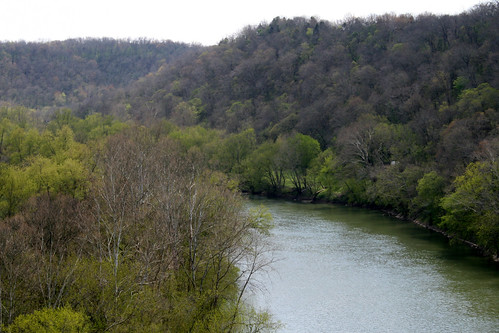
First foliage appears along the Kentucky River.
(*photo credit)
April 8, 2013 Conversations among Consumer Addicts
This reflection is not easy and we are tempted to say, virtually impossible, if we are limited to talking to or among ourselves. Over use of consumer products is a problem that first surfaced for me in the early 1970s right after Earth Day. I attempted to address this in a book The Contrasumers: A Citizen's Guide to Resource Conservation (Praeger) in 1974. A rational approach to controlling excessive consumption through resource conservation by concerned citizens appeared optimal at the time.
Preaching conservation is needed to avoid the sin of waste, but it is not enough, for citizens give lip service, find token savings, and consider problems solved. Consumer addiction continues and even grows on a worldwide scale. The most notorious addicts stand in line on Thanksgiving evening to be first to buy on Black Friday, the sacred season of materialists. The consumer culture is pervasive and crushes those who try to refute it, for appetites for material things are insatiable and growing. Have you ever reasoned with a confirmed smoker? Conducting a measured discussion makes them think they still have rational self-control.
Ought we to give up? The Spirit moves us to go beyond a one-to-one talk. The truth is we must bring the addict into a caring community and go beyond the individual process, for consumer addiction is a pressure placed by a materialistic peer-pressured, comfort-inducing system of fast vehicles and electronic devices. The addict needs help from others and within a formal setting of like-minded people seeking to overcome difficulties. The addict must find God, for without God there is no answer. Conservation practices are needed but are not enough. Without prayer and conversation with God, efforts at controlling the climate change crisis brought on by consumer-addicted people are incomplete. The book, Reclaiming the Commons, contains an eight-chapter survey of areas of commons, but the heart of the matter is the need for God. This is discussed in the final ninth chapter on recognizing addiction and surrendering to God.
Rest assured, we are immersed in this problem together. If we agree that we are addicted at least to oil and natural gas then we share something, our knowledge of addictions and concern about getting free from them. The basic community then is one not of an elite superior and poor inferior, but a total community in the depth of poverty and in need of God. Alcoholics Anonymous folks teach us something profound: recognize the addiction and get together to share a status in community; extend the conversation of sharing to reach to a Higher Power, to discover and involve our God. Without this the conversation remains solely at a rational level, and does not really touch the addict's heart.
Prayer: Lord, I realize that focus on simple lifestyle methods of previous reflections is simply insufficient. Teach us to recognize the critical condition of our world, that we are addicts exacerbating the crisis, and that we need your grace.

Blossom of the wild geranium, Geranium maculatum. Harlan Co., KY.
(*photo credit)
April 9, 2013 Glory of Creation
Reflecting on God's creation is all part of what we need to do in the process of Reclaiming the Commons. An excerpt is listedhere showing original glory and how human beings have damaged it:
---------------------
Natural beauty is uplifting, is shared, is widely appreciated among diverse cultures, is given as a gift, and is in need of protection. We Americans speak of "purple mountain's majesty" and "fruited plains." People of all cultural backgrounds, and especially primitive folks who live close to nature have much in common: they admire the natural beauty of an undisturbed or well-managed landscape -- a beauty in the eyes of all beholders of good will, but somewhat hidden to those more materially inclined.
Such admiration is uplifting and raises the soul to new heights. This natural treasure extends to mountains, rivers, seashores, and forests. All creation has charm and grace that only the hand of the Creator can give -- and natural scenes, whether physically visited or observed virtually, bestow on us immense peace of soul. Nature's beauty is the gateway to ever-deeper respect. In fact, the unmarred, resplendent earthly beauty is our primary Commons.
Marred beauty stands in utter contrast to natural beauty and most observers encounter eroded land, unreclaimed strip mines, loss of wildlife, and polluted air and water. If everything is connected to everything else (Barry Commoner's First Law of Ecology), then all parts of this world and all activities have some impact on other parts. Some lovers of Earth want to hold tightly to the purity of natural, untouched beauty, but that is wishful thinking at best. The free acts of individuals make a difference in society; good acts benefit all -- and bad ones harm all. Thus, we have beauty all about, but beauty is fragile and can vanish through misdeeds either by me, by us, or by others.
Enhanced beauty energizes us to go beyond admiration; we perceive danger and we can choose to protect and to beautify what has been damaged. Thus, mere appreciation of natural beauty untouched by human beings is not sufficient. Could beauty be reintroduced? Could we repair what has been spoiled in some way? This added treasure of cultivated and well-managed fields, gardens, and forests is a product of human sweat mingled with creative genius. In a 1971 lecture made before the American Association for the Advancement of Science in Washington, DC, Rene Dubos stressed that human ingenuity can enhance the environment and is not always a negative factor when involved with natural resources. He noted the progress of northern France where he grew up, and said the draining of the marsh lands for cultivated fields was really an enhancement of nature -- and the result was a beautiful landscape that could be appreciated by all who were residing or visiting. Human beings as enhancers of nature become part of nature.
-------------------
Prayer: Lord, inspire us to give glory to what is marred.

The arrival of spring upon the forest floor.
(*photo credit)
April 10, 2013 Life as Glory of Creation
I call heaven and earth to witness against you today; I set before you life or death, blessing or curse. Choose life, then,so that you and your descendants may live in the love of YHWH, your God. (Deuteronomy 30:19)
We can marvel as the flowers and buds come forth during this month -- Earth is coming back to life in all its many forms. That life is incredibly beautiful and it is varied and highly detailed -- a mystery to behold in its fullness. At this unfolding of new life we show gratitude; we realize that life is fragile and that it can be easily wounded or lost through neglect and misdeed. Yesterday's reflections are incomplete, and thus we have to go a step further. By affirming life we are more able to give life or enliven others, as this Reclaiming the Commons excerpt indicates:
----------------
Natural beauty enlivens, marred beauty frightens, and enhanced beauty challenges us to ever broader possibilities. We may be tempted to tiptoe through the tulips, focus on nature all around us and deny that harm is being done. We may look out, observe damage, and still excuse ourselves because we lack expertise to respond. We may seek to escape into the fictitious worlds that we create or into allurements that entice us. Enchanting beauty of nature can lead to overlooking damage. Marred beauty can lead to a sense of false humility, and to excuse ourselves as not being directly to blame or expert enough to change the situation. Enhanced beauty may be too great and thus we must escape to other pursuits or allurements. As we strive to reclaim the commons, we realize that our approach to nature calls for a spirituality in which we admire, observe, and resolve to protect and improve our threatened Earth...
Principle of Right to Life
Every person has the right to life in all its fullness. Any form of violence to the human person must be avoided (abortion, euthanasia, death penalty, warfare, interpersonal conflicts, and even humanly-caused climate change). An elementary example of failure to respect life is when sufficient oxygen is denied another. It follows from the right to life that our Global Commons must be preserved from human-caused harmful actions. Furthermore, we have a moral responsibility to find life-affirming alternatives to replace those improper actions.
---------------------------
Prayer: Lord, enliven our hearts in this verdant month of April so that we see all growth as affirming our right to life. Give us the power to show concern for others and to protect the beauty that you have given us in its fullness; help us to renew that which has been damaged through human misdeed and neglect.

Blue-eyed mary (Collinsia verna) of the figwort family.
(*photo credit)
April 11, 2013 Ways to Control Air and Related Pollution
In this month when we present excerpts from Chapter One of Reclaiming the Commons, we move from a reflection on beauty to actions to curb and control air pollution. The actions take effort and courage on the part of ordinary citizens and regulators:
-----------------
Air pollution affects certain regions more than others. Coal-burning power plants, heavy industry, and congested traffic are not evenly distributed on this planet. Particulate matter, nitrogen oxides, ozone, sulfur oxides, and other pollutants vary from negligible levels to hazardous conditions depending on proximity to sources. In 1990, the U.S. Congress established a "cap-and-trade" policy for sulfur dioxide emission, which has a declining cap over the years but free-of-charge tradeable rights to emit the pollutant; if companies emit at lower rates they can sell "rights to pollute" to other polluters...
...In more recent years, some people seeking fewer air-pollution regulations have argued that these are "job-killers." However, the U.S. Environmental Protection Agency (USEPA) argued in 2011 that two new proposed rules would create 1.5 million jobs, or about 300,000 on an annual average over a five-year period.
Light pollution hinders an appreciation of the night sky in urban areas. The natural celestial night is shrouded from our vision, a fact we confirm when traveling by plane at night and observing distant city lights. The urbanized half of the world's inhabitants are unable to gaze upon a beautiful night sky. The problem reaches to community regulation of light pollution, including street lights and vehicles. Tucson, Arizona, near where a major academic observatory is located, has taken steps to reduce light pollution. During the famous blackouts of the Second World War, drivers drove about with dimmed lights, street lighting was curbed, and windows were covered with black shades after dark. Peacetime solutions are more difficult; reflection shields could direct lighting downward where the pedestrian and driver could benefit. Additional municipal lights are meant for safety in higher crime areas. In essence, the night sky belongs to all to enjoy; and reclaiming it proves problematic.
Odors are recurring annoyances and can range from pleasant to highly irritating. In some cases, smoke or dust can also be unhealthy; in others such as a sickening smell of pulp mills or livestock yards, the odor may not be harmful in itself but does lower the quality of life in our commons. It is often quite difficult to take remedial steps to remove odors without curtailing operations that furnish jobs to the local labor force.
---------------
Prayer: Lord, give us the courage to act at this time and in such a way that we help save and improve our wounded Earth.
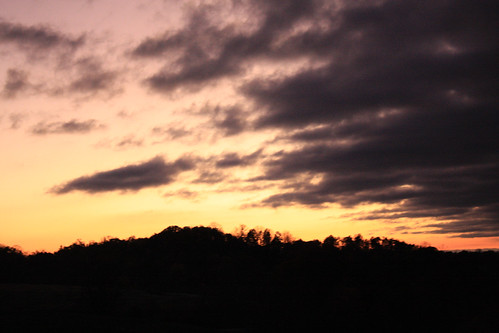
The beauty of a sunset.
(*photo credit)
April 12, 2013 Renewable Energy: Answer to Global Warming
On Global Warming Day we observe that the hottest year on record was last year 2012 and if experts are right, it may get even hotter. The warming is only part of the total effects of climate change, and so major hurricanes, floods and other disasters have appeared on the scene. Some consider a single or double degree rise in our body temperature is not important until we think of what each degree rise would do to each of us -- and a four degree rise would impair us or be fatal. Likewise, the planet is sensitive to a four degree rise here and is highly damaging to our eco-system. Can we reduce the march to world devastation or deny where things are and escape to other allurements? One course of action stated in Reclaiming the Commons is energy efficiency; another is a deliberate move to a renewable energy economy.
---------------------------
Renewable energy includes solar, wind, hydropower, geothermal and some biofuels. These are clean and virtually environmentally benign fuels; their installment costs are going down with new technical improvements and economies of scale. Today, in California and elsewhere, solar photovoltaic (PV) developers believe they can soon deliver solar energy at competitive prices. In 2011, the cost of generating wind power in choice areas of Europe and elsewhere has fallen below $69 per megawatt-hour; this compares favorably with $67 for coal-fired power plants and $56 with combined-cycle plants using natural gas.
Renewable energy sources certainly have great advantages over nuclear power, and fossil fuels that never paid their total environmental costs. "Some" biofuels means that distinctions have to be made; use of productive agricultural lands to grow corn for ethanol biofuels (amounting in normal years to one-quarter of the American corn crop) is wrongheaded, and subsidies for such practices need to be removed. Other biofuels encourage placing wildscape into cellulosic fiber production to the detriment of wildlife habitat. Economies result when biofuels are made from waste products (wood or agricultural wastes).
A 2030 renewable energy economy is possible but it will take an earnest effort. A recent study in the journal Energy Policy, projects that total global energy use could be renewable by satisfying the following goals: 4 million 5-MW wind turbines; 1.3 billion 3-kW roof-mounted solar PV systems; 90,000 300-MW solar power plants (including PV and concentrated solar); and a smattering of geothermal, wave and tidal power plants. This study left out biomass because of pollution and land use issues, as well as nuclear energy. However, this could be amended to include hydropower facilities as well as geothermal operations and omit many centralized solar power plants.
---------------------------------
Prayer: Lord, give us the light to see what is coming, to be
able to realize the situation, and to act as an enlightened people.

Hidden treasure following spring rains.
(*photo credit)
April 13, 2013 Is a Total Renewable Energy Economy Possible Soon?
This continuation of excerpts from Reclaiming the Commons is meant to show that we must think in an ecological fashion. With what is occurring and the will to win we could have a transformation in less than two decades and still save our planet from destruction.
------------------------
In 2012, one study by the University of Delaware says that renewable energy sources could meet 99% of U.S. Electrical demand by 2030 with projected wind and solar in 2030 at about half of today's wind and solar costs, whereas maintenance costs would be approximately the same. Another study in early 2011 by the World Wildlife Foundation International set a goal of 95% renewable energy by the year 2050. In 2050, total energy demand could be 15% lower than in 2005; heating needs of buildings could be cut by 60% through energy efficiency and use of solar power and geothermal heat. Suggestions included upgrading electricity grids, installing smart grids, halving meat consumption, and use of more public transportation.
Renewable energy sources are now receiving support from governmental agencies, principally at the state and national levels. However, curtailment of subsidies due to financial troubles could slow conversion to renewable energy sources. Renewable energy sources, coupled with energy conservation, soften or delay catastrophic climate-change conditions facing our planet; these result from the use of carbonaceous fuels (petroleum, coal, natural gas, tar sands). By utilizing safe and environmentally benign energy sources, pollution from extraction, processing, conversion to electricity, combustion, or disposal of waste materials could be reduced and eventually eliminated. Unfortunately, emerging nations are now adding many marginally- more efficient but still polluting coal power plants.
Renewable energy sources may be tied into the entire energy grid through net-metering programs with traditional electricity- delivery systems. Large-scale, national "Apollo-type" (from U.S. space efforts) renewable energy programs should be created in various advanced countries such as the EU, Japan, India, Israel, and others as well as in the U.S. New available solar products can be integrated into building roofs. Wind power is the fastest growing renewable source. Use of geothermal sources as well as utilization of agricultural wastes as biofuels are part of a sane renewable energy mix. Status-quo seekers have big money and propaganda machinery to cast doubt on future climate-change projections for several decades, as did the highly successful tobacco corporations' history of casting doubt for decades on smoking as the cause of cancer and other health problems. However, decentralized renewable energy programs are promising.
-----------------------------
Prayer: Lord, Light for the Nations, help us to enlighten others partly through the use of renewable energy sources.

Dolomedes, sunning on limestone slab.
(*photo credit)
April 14, 2013 Earthhealing and Life's Final Journey
I tell you most solemnly, when you were young
you put on your belt and walked where you liked;
but when you grow old you will stretch out your hands,
and someone else will put a belt round you
and take you where you would rather not go.
(John 21:18)
For an overall reflection on today's magnificent Gospel story (John's Chapter 21) see April 18, 2010. Can we go beyond the words that Jesus said to help Peter overcome his denial and reaffirm his commitment to follow the Lord? The risen Lord extends forgiveness and an added mission to feed lambs and sheep. Then comes the above passage in which the final journey of Peter's life is a road to Calvary that is part of the road of all Christians.
We are all too often in Peter's predicament, haunted with the imperfections of our past, and yet simultaneously confronted with a grand invitation to follow the Lord in the final leg of life's journey. A "Hail Mary" pertains to that final hour of life and stresses its importance. Healing involves acceptance of being healed and a willingness to look primarily ahead and not behind. The horizon looms before us, a magnetic pull that stirs the creative juices of our final mortal lives. The Church grows in age and wisdom over time; so maturation continues until the end.
I read this passage from John Chapter 21 to Virginia who did not want to go to a senior citizens' residence for her final period on Earth. She had been independent until her ninety-seventh year, but being a long-term earnest school teacher she listened intensely to the passage. Her faithful church attendance had allowed her to hear these words during many Easter seasons. However, only in old age did it strike home. During the ensuring weeks her friends said she read that passage to them. Yes, loss of independence is like being led away and having our feet and hands nailed to our cross. Still amid suffering we all, especially elders, discover Christ.
Our journey of life has had its moments of joy and sadness. We take what comes and make the best of it. We make models of others who endured their successful final journey, and surrendered their will to the Creator of all. We are really not in charge but it may take a lifetime to figure this out. The Lord is the master director and when we understand this we discover a deeper comfort from within. Our independence must be surrendered sooner or later. Immobility sets in through illness and age. All we can do is take our cross and walk along with Jesus on the way to Calvary. We are not alone but he is directing us, feeding us, and talking to us all the way. We may deceive ourselves to think we are distant from those moments, but are we really?
Prayer: Lord, assist us in growing in age and wisdom and to accept willingly the final phases of our journey in life, all the while knowing that life passes ever so quickly.

Comma butterfly, Polygonia comma.
(*photo credit)
April 15, 2013 Do We Take Electricity for Granted?
When storms strike as did Sandy last year and lights go out over vast regions, economic and social life comes to a standstill. We often forget that utility-generated electricity, that essential to modern life, was not even present a little over a hundred years ago. In fact, in my infant years, our new house built during the Great Depression was wired for electricity but my folks could not afford a utility hook-up. Instead, we had kerosene lamps, coal-fired cooking stove, cistern water pumped by hand, clothes hand- washing and line dried, and an ice box for refrigeration. Housework was certainly more burdensome and preparing meals took more ingenuity than today.
The electric system that we know is like an umbilical cord; without it, immobility set in from street lighting to computerized businesses; gas pumps do not work and heating and cooling systems shut down. It takes fuel to keep things operating, and yet the world seems to be depending as much if not more on fossil fuels to help produce electricity. Today the mix of fuels used to allow American utilities to hum is in great flux. Costly and dangerous nuclear power has plateaued; dirty coal is in sharp decline (from 42% three years ago to 33% and going down); fracked natural gas is becoming an export commodity. Renewable sources, though handicapped for lacking a fair playing field, are making their presence felt in a world threatened by climate change.
During 2012 that striving has paid off in the United States where almost half (49.1%) of all new domestic electrical generating capacity installed is renewable (a total of 12,656 MW). The Federal Energy Regulatory Commission's Office of Energy Projects announced at the start of 2013 that in the previous twelve months wind was the primary new source, with 1674 new "units" (total of 10,689 MW) followed by solar with 240 units totaling 1,476 MW. Biomass added 100 units or 543 MW, geothermal steam and water each added 13 units for 149 MW and 99 MW respectively. On the other hand, new natural-gas-fueled facilities totaled 8,746 MW (33.2%), coal 4,510 MW, nuclear 125 MW and oil 49 MW. New renewable energy sources increased by over 50% over the 8,571 MW added in 2011. In addition, renewable sources now account for 15.4% of total installed U.S. generating capacity (over half of this is currently hydro), more than combined nuclear and oil capacities.
Renewable-fuel-generated electricity is arriving rapidly but with only a fraction of the 450-billion tax incentives and perks of the fossil fuel industry. Likewise, the rise of low-cost fracked natural gas stands as a new and unexpected hurdle for going to a total renewable energy economy by 2050. So-called "clean" natural gas is really dirty, when all costs from extraction and production are totaled. Two actions must be taken simultaneously, placing strict regulations on fracking, and giving incentives for renewable energy utilization in electric production.
Prayer: Lord, give us the courage to confront Big Energy.
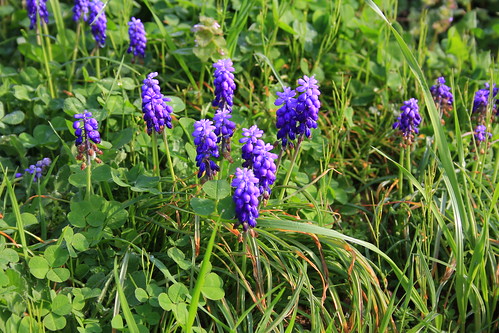
Grape-hyacinths in full bloom.
(*photo credit)
April 16, 2013 Local Voluntary Hospital Chaplains
This year our local hospital listed again its annual weekly schedules, and the number of ministers willing to serve dropped from eight (once every two months) to five, of which I am one. This adds volunteer work for a budding octogenarian, and is not easy for several reasons. For one, a person has no idea what problems the next room will bring. It may be someone who desires to talk and to be prayed with, or it may be someone who wants no part of your ministry. Being refused is hard on someone offering voluntary service -- and perhaps on professionals as well. However, a time of joy is when the ill person really wants someone to sit and talk.
The volunteer chaplain has to be sensitive to the people, for one does not want to appear prying even by a simple remark. The common salutation, "How are you?" would bring a response such as "If fine, I wouldn't be here." The sharp response when not expected can be answered with a laugh or smile, and all too often that can be the starter of a quick but honest chat. I am often reminded at this small hospital with no permanent chaplain that I lack the professionalism of permanent religious staff -- but that is the price of being small town and poor. I trust the Lord helps us make up for what we fail in bedside finesse.
One aspect of the visit is to size the situation quickly. Must I identify myself and make a quick offer of prayer and move on, or should I show a willingness to linger and extend the visit? This is not easy to determine quickly. If the ill person has visitors their welcoming or rejecting mode tells me much about length of stay. Quite often visitors have been there at the loved one's bedside for an extended length of time and they desire a visit from someone other than a health professional makes.
The volunteer has to be open to learn something new from every visit. If we are sensitive, this is done as much in gesture and facial expression as in word. We quickly learn that people approach their own ailments in vastly different ways, and that the light-hearted are generally more able to recover. On occasion, the ill is on his or her way to eternity, and this becomes an opportunity to pray with family members, who are suffering as well right at this time. At such times the chaplain's presence can be deeply appreciated. That final dying moment is a precious time, and company may or may not be welcome.
Here in Appalachia, most of the ill are Christian, whether church attendees or not. However, few have a basic concept of offering their sufferings with the Lord on Calvary, for that was an event of long ago for them, so why bring that up? Mentioning the presence of Christ here has some meaning without necessarily relating his presence to Calvary, except among Christians who realize the glory of the cross. It is a moment of grace.
Prayer: Lord, give us the strength to help those who are ill,
and to offer our gifts while imperfect with greater generosity.
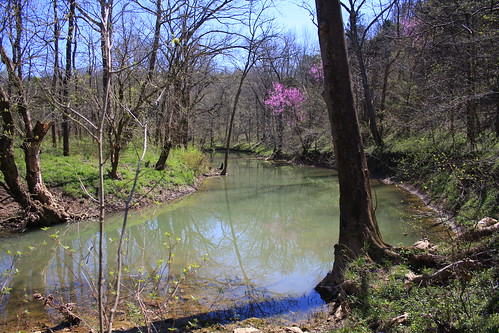
Rural Kentucky spring scene.
(*photo credit)
April 17, 2013 Is this true? First Impression is a Lasting One
Whoever takes pride in saying that one's first impression lasts throughout life must consider what this could do to certain people we might meet. Is this the moment of deciding likes or dislikes? Some may pride themselves in the quick determination, but what does it do in their relationship to people who suspect the quick choice. Let's ask ourselves six basic questions:
Is rapid impression a mark of our immaturity or rash judgment?
Do we take pride in coming to quick decisions that really call for much more information? Maybe it is best to forget first impressions and concentrate on going slower in everything, especially judging the qualities of other people.
Are our impressions skin deep? Many times people have a distracting condition whether facial, their teeth, their gait, hair style, their voice, or other things that immediately draws attention. That first impression says virtually nothing about the person as such. Can we avoid allowing these first impressions from interfering in our ensuing conversation?
Doesn't our attitude affect people we meet? Some people with noticeable characteristics, which they know are noticeable in company or in quick response situations, are not fully able to present themselves well. Does this allow us to say our first impression is true? Isn't it partly our fault through an attitude that the person realizes very quickly makes them vulnerable to quick judgment?
Are we overly opinionated? If first impressions are lasting, then maybe we ought not make an initial impression and reserve judgment until later or never make one. How are we so sure that we can cast a judgment on an individual in a single second, especially if we are distracted, depressed, or even unwilling to open ourselves totally to the other? Our attitude must be weighed in the current culture of glib and brief encounters.
Why allow impressions to dominate our outlooks? We may want to hear the person through and immediate impressions may be the sign that we come to judgments too quickly and are poor listeners. Involved in the rapid impression is admission that we are not deep in the way we come to judgments, or that we have too high an opinion of our own quick responses.
Are we not willing to change impressions? The terrible impression that a young Abe Lincoln made on the successful trial lawyer Stanton did not hinder Lincoln from appointing him to his cabinet. Over time, the relationship of the two progressed to deep mutual respect and that first Stanton impression proved false.
Prayer: Lord, if I take pride in first impressions, please help me to overcome this adversity, so that more genuine relationships, even though brief, can develop and remain.

Colors of spring.
(*photo credit)
April 18, 2013 The "Right" to Automatic Weapons
At this 238th anniversary of the Battle of Lexington, it is imperative that we talk about bearing arms or at least possessing
ammunition. The right to bear arms is hotly debated at this time in the light of the Colorado and Connecticut mass killings last year. People are "up in arms" in what to do about reducing gun violence. Much about the "private" versus "community" right to bear arms is worth reflection, though overlooked by more immediate political strategies. Recall that the British were marching to Concord to take over a community repository of arms/ammo. The patriots had their single-shot muzzle-loaders (they never conceived of automatic weapons), but community ammo was what was at stake.
An automatic clip and weapon are considered here as a single firing unit. What is the automatic weapon worth without its ammo? Why on Earth does an individual citizen need to use a military style weapon for hunting or target practice or defense of home? Even if training were provided, why should such a lethal and easily mishandled device be allowed on the loose? Can't these be banned again as once before in the 1990s? Even if all automatic weapons cannot be collected, their improper possession as with rocket launchers or machine guns could be a matter of confiscation. Rewards to those who report possession of lethal weapons could go a long way in ridding the nation of these devices.
The mass shootings alluded to above occurred when a multitude of gun deaths are reported on a daily basis. We are quick to forbid bombs and grenades and other such weapons in the hands of individuals. Why automatic weapons except to satisfy the effort of the National Rifle Association (NRA) and weapons' manufacturers? Not only was there a problem with issuing such weapons to unstable individuals who became mass shooters -- and there are more out there right now; the sales of automatic weapons have skyrocketed, especially since the last of these recent episodes. Unfortunately, new episodes will soon make the two mentioned outdated.
Such weapons only add to the insecurity of our nation as such. All the while, the NRA proposes to arm every classroom teacher and post armed guards at every school. Do they prefer these teachers and administrators carry automatic weapons, for one could spray the area from where the targeted assailants are coming from? Weaponry does the opposite in establishing security, for guns are no answer. We do have an "automatic weapon" in a spiritual sense that ought not be banned. Powerful prayer can be directed at any time to the Almighty. Prayer ensures protective response immediately and has a rapid, low cost, easily operable response. This is true security! The Lord says we can build barns and store materials for insurance and then on the very night the building is completed the unwise builder's life would be taken. We can only trust in God, not in the security of automatic weaponry.
Prayer: Lord, help our country to come to terms with what individuals can do and what the nation must do as a people.

Preparing to open, buds in April.
(*photo credit)
April 19, 2013 Is Escaping Methane Hot Air or Scorching Gas?
American optimists cite the rise of methane as choice for one-third of the fuel for American electricity production as a greening phenomenon. In a mere three years, fracked lower-priced natural gas has replaced coal is becoming the primary fuel of power plant choice. I observe the 110-car coal trains (switched near my residence) reduced in number from about six (at one time per day) to two per week over a short time period In 2013, hundreds of Appalachian coal miners are being laid off and the prospects of being rehired depends on which American coal companies furnish exports to India, China, and to Europe.
Fracking has some water pollution problems due to amount used in the process containing certain chemicals; the discharge of these wastes can induce earthquakes; communities can be torn by one neighbor getting handsome payments and a neighbor dealing with added noise and congestion. But these are not the major concerns. Some researchers have said that fracked methane leakages below 3.2% would still give an advantage of this fuel over pollution spewing from coal-fired plants. The USEPA suggested leakage rates in 2009 of 2.4% from total natural gas production. However, one wonders about that unsubstantiated number, especially since methane, the main component of natural gas, has a long-term greenhouse effect at least 20 times greater than carbon dioxide.
In 2012 the National Oceanic and Atmospheric Administration (NOAA) and the University of Colorado in Boulder reported 4% leakage of methane in Colorado natural gas hydraulic fracking; they also observed a 9% methane leakage rate into the atmosphere at a Utah fracking facility. If the current USEPA surveys now being conducted confirm such findings, the situation is far more serious than suggested by the Bill Moyers January interview and others who focus on carbon dioxide emissions in reference to global warming. Concerted efforts using aircraft to measure atmospheric pollutants are being employed, and bad news is starting to come in. If rates are higher than 3% then fracked natural gas is INCREASING climate change rates, not decreasing them as optimists declare.
This phenomenon occurs while the U.S. emissions of carbon dioxide decline in contrast to that of China and India. Due to high-cost Russian natural gas that is traditionally extracted and involves high transit fees, Europeans are reverting to coal as the interim fuel before the total renewable energy era. Reference: "Europe's Dirty Secret: The Unwelcome Renaissance," The Economist, January 5, 2013, p.55-6. Will low-priced natural gas delay the advent of renewables (wind, solar, geothermal, hydropower, biofuels, and tidal)? The plentiful supply of gas locked within shale formations in many countries is perhaps changing the picture considerably for the worst without more complete surveys and tighter regulations on extraction and processing.
Prayer: Lord, give us the wisdom to clearly see the world situation and to have the courage to change it for the better.

Hallmark of springtime in Appalachia, the redbud in bloom.
(*photo credit)
April 20, 2013 Fossil Fuel Emission Problems and Catastrophe
The climax of Chapter One of Reclaiming the Commons is the emerging need to do something different now.
-------------------------------
The energy picture is changing rapidly. Fossil fuels are being obtained from more feasible technologies. Today in America, cheap coal is being replaced by plentiful, lower-cost natural gas, allowing our country to shift from a gas importer to a net exporter. As of late 2012, some 1,199 new coal plants are in the works with over 1.4 million megawatts of capacity. These stem from 483 different power companies in 59 nations, with a little over three-quarters of them proposed for China and India with an exploding appetite for energy. Even the U.S. (with coal losing ground to natural gas) is planning 36 new coal-fired power plants with a total combined capacity of 20 gigawatts...
Controlling carbon dioxide emissions is problematic. Sequestering carbon dioxide emissions from burning coal is a distant dream. Possibly new power plants in developing nations may be cleaner, but their number and emissions' volumes overwhelm efficiency savings. More plants cause MORE carbon dioxide along with worrisome mercury emissions and other hazardous pollutants. Acting in a socially responsible manner means making fossil fuels pay their fair share of environmental pollution damages, and thereby be competitive with wind and solar. However, replacement of fossil fuels with renewable energy sources must be coupled with a broad-based program of energy efficiency. All of this takes planning, policy adjustments, and time to implement.
Impending environmental catastrophe emerges as a daunting challenge to human cooperative efforts. In August 1914, nations took sides with bands playing the martial music of warfare. What was expected to be a quick war turned into a slaughter of millions through trench warfare, poison gas, and massive artillery shelling. And the poppies bloom on Flanders fields. That war "to end all wars" was an unexpected human-caused catastrophe. A repeat? The League of Nations failed and in its aftermath came the Second World War. Furthermore, posturing world leaders at the failed Copenhagen Climate Conference in late 2009 show lessons unlearned. Will history teach us to reclaim our commons before disaster comes?
The problem grows worse. In November, 2012 a report by the World Bank tells why a 4oC warmer world must be avoided. The report says that at the current rate of climate change we can expect a 7.2o Fahrenheit rise by 2100. This would be disastrous with heat, drought, and floods. Global temperatures have already risen 0.8oC above pre-industrial levels and appear likely to exceed the United Nations' goal of 2oC and reach 3oC and a 20% chance of going over 4oC by 2100. If the permafrost starts melting the disaster will be even worse. This is catastrophe unfolding!
-------------------
Prayer: Lord, empower us to act with urgency.
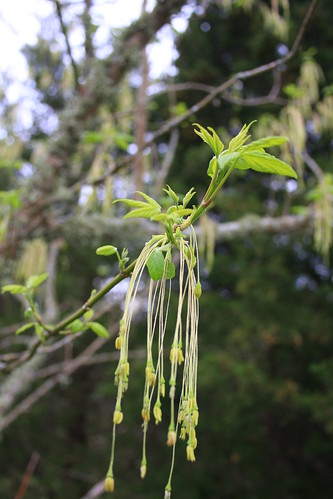
Flowers of the boxelder (maple), Acer negrundo.
(*photo credit)
April 21, 2013 Shepherding and Pasturing among Wounded Sheep
The lamb who is at the throne will be their shepherd and will lead them to springs of living water; and God will wipe away all tears from their eyes. (Rev. 7:17)
We often imagine the persecuted to whom this passage in Revelation is directed as distant North Koreans and sufferers of other oppressive regimes -- but that is not the whole picture. We could speak of the suffering people closer at home: prisoners, home-bound, terminally ill, mistreated children, homeless, those not able to meet their bills or provide food, and the mentally ill. True enough, these believers are all part of that vast multitude of the followers of the Lamb. We each can add a choice name of those closer-to-home sufferers who await the blessedness of eternity. However, let's add another category -- WE the poor.
Yes, we are in this together, and must not opt out by denying our situation, excusing ourselves as too young or old, or too weak or strong. To participate in the enterprise is to accept the social nature of the consumer addiction sweeping our planet at this time. We either are swept up in the consumption culture or are silent as to its effects on our neighbors near and far, from North America and Europe through Asia and the far corners of the planet. Consumption of non-essential goods is pervasive and growing at an immense rate. Projections are that air conditioning will multiply forty-fold in this century. With pretensions we may puff ourselves like grouse and say we have growing material needs that will ultimately benefit ourselves and others in the consumer economy.
We are people called to service, and must understand not how much better we are than others but how we are here among the impoverished in spirit awaiting the coming of the Lord. This togetherness is not some forced destitution, for all need proper shoes and means of transportation and communication. The solidarity is with those who desire to do something to save a planet moving rapidly to self-destruction through severe climate change that could do irreversible damage if not stopped now. Through global working together we can address this situation.
WE are in this together and so our solidarity is not that of an elite or privileged above the rabble. Let's not think we have prized information that we will spoon feed peons. We are socially addicted as long as we allow the privileged to deprive groups of what is rightfully theirs. Social ills afflict us all and we suffer with our more destitute brothers and sisters through commission or omission. If we recognize our poverty, we will be fitting instruments to help change the world. As we move forward on a more serious note in this Year of Faith let's realize that our sharing with others is a means of showing God's love for all.
Prayer: Lord, help us see how impoverished we really are, how much we depend on our Good Shepherd, and how we are included in the ones who suffer due to our individual or collective misdeeds.

Common blue violet, Viola sororia.
(*photo credit)
April 22, 2013 Lou Lipps: A Down-to-Earth Jesuit
This is Earth Day and generally themes are related to pressing down-to-Earth issues. For Jesuits this is also the feast of Mary, the Mother of the Society of Jesus. Until now, this environmental website has overlooked that companion spiritual feast. Upon preparing for how to commemorate both days, I was writing a homily for a recently deceased Jesuit, Lou Lipps, and though he wasn't an "environmentalist" as such, he was truly down-to-Earth. ----------
Memorial Talks: January 28, 2013 & February 4, 2013
Lou Lipps had an eternal twinkle in his eyes that showed goodness without saying a word, the windows to a gentle soul. Lou was a down-to-earth person who while gone on to the Lord, still remains with us. He would be the last to agree with what is said, but it is true nonetheless. Whatever he thought, he rarely said, for his kindness always exuded an approving smile. Lou can be stamped as a gentle person, not pretentious, deeply humble, willing to listen, totally caring, and one who is somehow still down to Earth. We come today to show how Lou Lipps profoundly influenced our lives during 17 years of ministry in Kentucky's Appalachia. He served as spiritual advisor, confessor, and friend to many especially religious women -- and all who called for help. Some share special remembrances that we are able to treasure together.
Lou's first priestly ministry after ordination and training was to teach philosophy at Xavier University. This overlapped my student days about sixty years ago. I remarked to another who mistook him for a young student, "He is a priest? I thought all Jesuit teachers are old men." Yes, in younger years he was blessed with an extremely youthful face that remained for years prior to the full facial hair of wisdom. In fact, by growing his proverbial beard Lou happened to pass from youth to old age without middle years. He would call this exaggerated (only my way of speaking), for he surely passed through a middle age of busyness and continual hard work. I suspect that the vastly different ministries in which he engaged honed him for a ministry few others had, namely to act as Santa Claus to children in restaurants and all along the way. A truly gentle ministry for a person with such a variety.
Lou never ever intended to stop working, and throughout his octogenarian years he gave countless retreats and spiritual counseling sessions, and his ministry extended from Appalachia to the urban poor in Cincinnati. All good things come to an end and so he had to close down. My last meeting with him was at the ordination banquet in June, 2011 right before Lou's ninetieth birthday. He was just told to move to Columbiere and stop his current work. Immobility and loss of ministry were nailing his feet and hands to a cross. Yes, he deserved a breather before the eternal journey. Thank you Lord, for giving us people who speak with a twinkle in their eyes more than the weight of their words, and who were and who remain truly down-to-Earth.
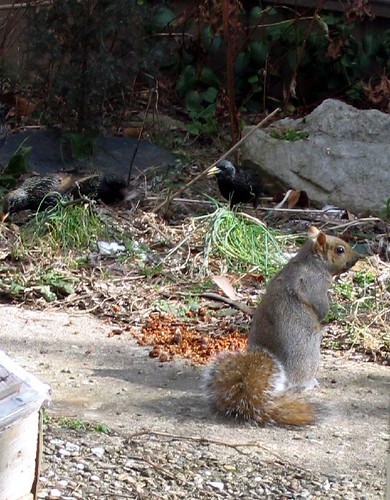
Squirell and starlings learn to share.
(*photo credit)
April 23, 2013 Moderation, Proper Food Choices, and Dieting
Moderation in all things is what is sought, especially by those of us who desire to eat. AARP The Magazine had an article in the December 2012-January 3013 issue by John White, MD who has a variety of helpful hints for loosing weight without really dieting. He wisely points to food choices and thus has a dual listing of "eat this... instead of that." This includes whole-wheat pasta, pretzels, and bread instead of white pasta, pretzels, and bread. It is like an examination of conscience and is worth pondering because many of us slip in some categories from occasional to frequent eating of what is not the most perfect choice.
In fact, White's recommendations are not a matter of dispute since as a co-founder of CSPI (with its current "Nutrition Action" with 850,000 members) I do not think co-founder Mike Jacobson and associates would disagree. In our November 28, 2009 reflection in a series on food issues, "food choices" are listed. We talk of using water instead of soft drinks. Item choices include those of fewer calories but equally filling -- and the snacking often is a good idea if with less sugary, salty and fatty foods. Snack on fruit and raw vegetables, unbuttered popcorn, seeds, and nuts instead of cookies, potato chips, and crackers. The same advice goes for use of brown rice instead of white rice and high fiber instead of sugary cold cereals. I dismiss steal-cut oats if we have old-fashioned ones present.
Proper food choice is better than dieting but that is easier said for the wealthy than for the poor. Our region does not have all better choice materials in stores that some of us frequent, nor at prices that we can afford when we need to live on far less than others. An answer is to grow one's salad and soup ingredients year-round, because fresh veggies are so expensive in stores.
Rare indulgence is what is better than talking about good and bad foods -- and we discussed this when CSPI produced "Nutrition Scoreboard" forty years ago. Should we classify foods as bad or good? Active people with no weight problem would say that certain foods, such as the fried chicken, are good. In youth, we had this more often than the rare once a week, but we did heavy farm work to work it off. Except for specific poisons that we should never take, I regard most food as good and my appetite is extremely broad -- but I have a post-jogging weight problem as do the majority of Americans old, middle age, and young. Rather than create classes or even lists of food, beyond what is recorded above, let us talk about moderation in all things. Certain treats that someone likes ought to be rare whether that be fried chicken, fish sticks, and milk chocolate, all on White's no-no listing. A food class called "never" is only meant for those with specific allergies and other health conditions.
Prayer: Lord, help us to enjoy our meals and celebrate without guilt and with moderation in all things. Give us insight to choose wisely what is to be eaten with greater or lesser frequency.

Toadstool, hidden on forest floor. Pulaski Co., KY.
(*photo credit)
April 24, 2013 Break the Myth: More Handouts to the Poor
We are in the middle of a grand struggle to redistribute resources from those with excess to those in essential need. Amid a massive amount of data being gathered on this enterprise, we often wonder whether the redistribution is actually occurring, as the disparity of wealth in this county seems to continue its upward track, even with a little change in taxing the wealthiest at the start of this year. This is time spent wrangling over entitlement and hidden talk is focused on shunted resources to the poorest one-fifth of our nation in the form of subsidies, food stamps, and affordable medical care.
Studies confirm that the redistribution is not in that direction of rich to poor but in fact the flow is and has been for some time in the opposite direction, with one-fifth and especially the top 1% benefiting the most from somewhat hidden tax loopholes, deductions, and hidden benefits. The book, Wealth and Welfare States by Irwin Garfinkel, Lee Rainwater, and Timothy Smeeding points out that the federal government spends four times as much on subsidizing housing for the richest one-fifth of Americans as it does on public housing for the poorest one-fifth. This is mainly a subsidy as mortgage-interest deductions. If all the wealthy's entitlements are included, the trend is still for redistribution to the upper end of the economic spectrum, because these have the influence to reduce or eliminate efforts at redistribution in the direction of justice.
Taxes do not really carry out this goal as has been pointed out in recent years. Over 60% of the unreformed tax preferences, which include tax exemptions (taxes paid on mortgages and contributions to gold-plated health insurance), flow to the wealthiest 20% of the population -- and this is never addressed. The wealthy do not have to hold out their bejeweled hand; all their benefits slip under the door when citizens are not looking.
How on Earth can this lack of just redistribution be changed? One of the surest ways is to enter into the political battle and call for reform of the complex tax code with its many favors for the wealthy, whether individuals or corporations. All need to pay their fair share and this would be the most efficient way to bring redistribution. Maybe the recent efforts by our friends in France to tax the wealthy at a 75% rate would allow for the funds needed to bring about employment of all people and the reconstruction of our deteriorating infrastructure. French millionaires go over the border to Belgium or escape to Russia with lower tax rates. Thus, mobility of people and especially their loot to tax havens are difficult to address, but demand a system with global regulations.
Prayer: Lord, teach us to be fair especially to the poor and help us to overcome the crazy myths that put blame on the poor and allow the wealthy off scot-free. Give us the energy to level the playing field and to do so for the cause of justice.
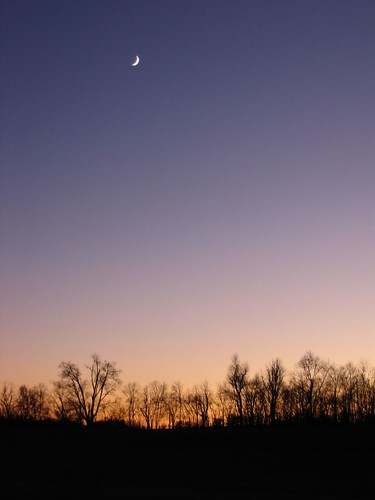
Vibrant colors of sunset.
(*photo credit)
April 25, 2013 Over-Competitiveness in Our Culture
Unfortunately, we live in a highly competitive culture, and many would prefer to say the inverse or "fortunately," since for them this is what makes America Number One. Competition is all around us from being first in line for commercial sales to weaving more rapidly through traffic, from support or disapproval of a football team to that of a coach, from who is enrolled in the most prestigious school or draws the attention in the press, to which movie or song is best received by the public. For a competitive culture, quality enjoyment or joy in sharing are not the most important factors. Actually, I came from a highly competitive family and that fact showed for better and worse on a number of occasions in playing games and cards. They rejected my non-competitive creations as though I was crazy.
Perhaps the "unfortunate" condition stems from the ugly statistic that 1.3 million Americans have heart attacks each year partly from stress -- and competition can be stressful. Some handle this condition better than others, but we pause when people die from competitive sports at a young age or from a heart attack coming in watching a close game at older age. Stress is part of competition, for without the strain and focus required by the one performing, competing groups are not successful. The easy going are not successful competitors -- and we know it. However, they generally live a little longer and with a better quality of life.
What do we do to reduce over-competitiveness so as to improve the quality of life for all? We could learn much from select (not all) primitive cultures where sharing is primary, and not undercutting another in order to get ahead. Conquering another is not everything, even though those seeking world records by climbing mountains or enduring hardships on the high seas may think so. A prime consideration is to wish another success and allow them to take a lead, but some would argue that this is throwing the competitive game -- and that was proved in the penalties given at this last summer Olympics. Actually, the rage of audiences would subside if all came to watch a good performance and not one team beating another. Modern athletics is less bloody than gladiators in the Roman stadium or internecine battles - or is it?
Another remedy for over-competitiveness is working together as a team to conquer the scourges of our planet -- illnesses, diseases, lack of proper food and water, and especially tracing the contamination of our air through industrial practices and consumer lifestyle. Maybe the multi-million dollar coaches' salaries could be far better spent by academic institutions that are equipped to organize and conduct joint research projects. One government-funded project at an institution to which I was acquainted had a host of participants dip their hand in the research funds and did very little to further the project. Team work was forgotten.
Prayer: Lord, help us overcome the competition that seeks to
conquer another, and give us the grace to share and work together.
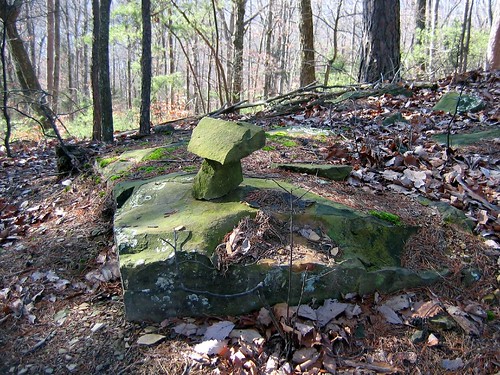
Impromptu rock sculpture, discovered on Appalachian hike.
(*photo credit)
April 26, 2013 Strengths and Weaknesses of Church as Institution
This website has never been critical of the Church. Let's keep it that way. Most commentators will admit that emerging from the Roman catacombs did change the practices of Christians and led to far larger numbers of people in church attendance and public norms of conformity. What was outlawed now became approved. Within a mere few decades persecuted people were tolerated and then given preferential treatment. By the mid-fifth century the Bishop of Rome, Leo the Great, became the equivalent of a temporal ruler. Distinguishing the trade-offs between a powerless persecuted body and a worldwide temporal voice is worthy of reflection.
Strengths of a public and recognized Church include being witness to those in need when persecutions of disasters occur. Any astute observer except the most deeply biased will be happy when the Church speaks out against a corrupt dictator or urge members to rush aid to disaster victims of an earthquake or hurricane. For a brief moment, the critics are uncharacteristically silent or even give begrudging approval. A public voice on pressing moral issues of our day from death penalty to immigration is most often welcomed by the progressive community. Other social issues win others. Church visibility allows the message to be heard in the noisy marketplace of competing ideas. Christianity comprises one-third of the human race and the weight of its voice cannot be denied when spoken clearly. Institutional structures that magnify that voice are regarded as praiseworthy. Publicizing devoted Christians who sacrifice their lives for others is a height of public witnessing.
Weaknesses include the infernal politics that accompanies the existence of institutions. Some are gifted to handling the art with finesse and some not so -- and that becomes a source of criticism wherein the spiritual message is submerged. However, there is a greater and inherent weakness whether the institution is a hospital, college, or charitable group, namely, keeping these places functioning takes considerable funding whether public or private. In this modern age of competition for students and clients, physical facilities tend to be elaborate and costly, insurance requires jumping hoops, and faculty salaries and perks are burdensome. To finance such enterprises requires friendly relations to public and private providers of money and influence. If those providers are highly principled then the money comes with few strings; if the system underlying the funding source has weaknesses it means toning down faults by receivers who prefer not to bite the hand that feeds the institution.
The thin line of balance between magnifying strengths and overcoming weaknesses takes exceptional leaders and followers. No one is perfect, but what is at stake is our witnessing to the truth. Often the criticism required for witness will require severe curbs on ministry involving complex institutions.
Prayer: Lord, enhance our strengths and give us the courage to overcome our weaknesses so that your message may be well received.
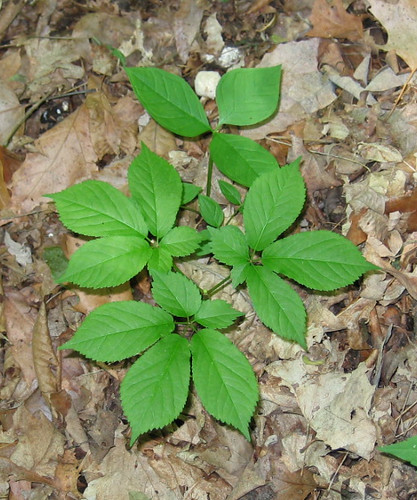
Ginseng, Panax quinquefolium.
(*photo credit)
April 27, 2013 The Church Acting as Witness
A voice crying in the wilderness...
And all mankind will see the salvation of God.
(Luke 3:4-6)
At the end of each chapter in Reclaiming the Commons we present some aspect of the Church's mission. We begin with the final section of Chapter One focusing in on the important aspects of climate change. Here Church bears witness to both the beauty of God's blessing and the ugliness of human misdeeds found in pollution and wasteful resource misuse.
-----------------------------------------
The Church has and must continue to speak out for the most vulnerable and for all who cannot speak for themselves. We know that fragile nascent human life, or "being born," requires human protective measures and responsibility -- and thus is deserving of mutual respect and extra effort. We must speak out and resist policies allowing the termination of life through willful means. We defend the unborn, elderly, ill, those in prison, and Earth as source of vitality. Our Earth is "one great act of giving birth" (Rom.8:22) and we accept responsibility for this living but threatened planet. On a practical level, the Church must champion resource conservation through good insulation practices and use of energy efficient devices in institutional life. Moreover, this is equally a pro-life issue.
Action 1 -- Encourage blessings.
Books contain a host of special formal blessings, all of which have great value and many are beautifully worded. They may prove of great assistance to clergy and church leaders on formal occasions. However, a blessing from the heart is also of great value. It is critical at these difficult times to teach all believers to give blessings in abundance on many occasions foreseen, and unforeseen.
The cost of reducing greenhouse gas emission, increasing reforestation, cutting air pollutants and helping poor regions adapt to climate change pales in comparison to the price the world will pay if we fail to act now. Pontifical Academy of Sciences
Action 2 -- Boldly address human-caused Climate Change.
If ever a crusade (though it may have negative connotations) ought to be waged, the time is right to act through homilies, talks, writings, and all forms of interactions to defend our Earth. This stance in defense of our endangered planet is needed right now and yet some still deny its relevance. We must confront those who mistreat the environment and accept responsibility for renewal. Our ancestors did not know human beings have the power to threaten planetary life. Today, we are becoming aware that current fossil fuel practices are leading to disaster and we must respond with all of our power to act to avoid catastrophe.
---------------------------
Prayer: Lord, help us bear witness to what must be done today.

Fossil find (Zoophycus). Rowan Co., KY.
(*photo credit)
April 28, 2013 Earth Healing as a Form of Glorification
"Now" has the son of Man been glorified, and in him God has been glorified. (John 13:31)
Jesuits have a motto Ad Majorem Dei Gloriam (To the Greater
Glory of God). How we can give glory or have God glorified is worth much reflection. The words of glorification by Jesus (John 13) were spoken at the Last Supper right after Judas departed on his betrayal mission. The entirety of the coming days was included in this glorification that is Jesus' suffering, death and resurrection all taken as one historic event in our world. In some way that event, monumental for all believers, also gives a place of glory to Earth on which the happening occurs. Given all the aeons of time and the immense multitude of space, at this location in Jerusalem in Israel redemption occurred. Christ offered himself totally for the salvation of the world -- and God is glorified in the fullness of the offering.
Easter glory is part of our deeper reflection during this joyful season. We rise with Christ so that we can be Easter people. We are called to enter into the mystery of the risen Lord that extends in space and time; WE are involved in this event in the HERE and NOW. All of this has been spoken about at length in other reflections and yet the depth of the mystery of our involvement must be retold because of its supreme importance. Our physical Earth is threatened, and we are the ones as healers who are the hands and feet of the risen Lord. In Easter we see Christ's glory and in this insight we begin to discover the potential of giving glory to others.
Faith is needed to believe that glorification is possible through healing. In 1967, my ordination prayer card read, "Faith is seeing the brilliant countenance of Christ looking up at us from every creature." (The card is copyrighted by Abbey Press). At times our sight becomes blinded and glory goes unrecognized. At this critical point in history we pray scales fall from our eyes and we see the suffering Christ, a Calvary on Earth herself that must be recognized. We make resurrection possible for Earth herself for, if she (Earth) can be renewed, we give witness to the reality of resurrection.
The glory we receive in believing in the Lord is the glory we share with him. What we do in glorification (making glory) shows forth the Creator, for we are empowered through faith to enter fully into the Easter mystery, and this means a monumental task is before us in the spirit of the Christ who suffered, died and rose for us. We cannot tarry nor be like Judas who left the Supper; we are called to enhance the glorification once began, and we do so with the faith that we go to Calvary with Jesus.
Prayer: Lord, give us the strength to continue the struggle in which we are engaged and so give you glory in our efforts.
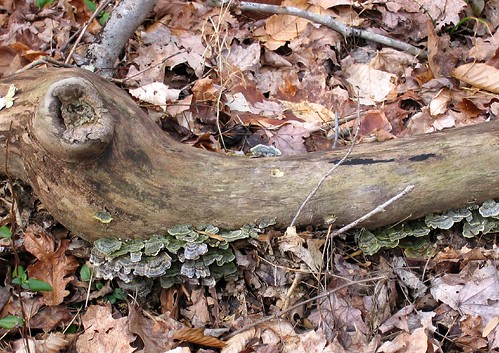
Fungal growth overtakes log, nature's renewal.
(*photo credit)
April 29, 2013 Looking for Renewal in Urgent Times
Springtime is a time of renewal. The old must give way as a new growing season begins. Hopes run high that we will have enough sunlight, rain, and personal stamina and courage to move through this season successfully.
Renew what? Everything around us, our neighborhood, our home life, our office, our community, our nation, our world all are subject to renewal. Much work to bring creation to completion is still to occur, and where resources have been taken by the privileged from the commons, they need to be reclaimed. All resources are gifts to be guarded for the benefit of the many.
Is renewal possible? One of the problems in the past has been that we cannot find the energy whether physical or spiritual to bring about renewal in our lives. We feel helpless as individuals to effect any change. From the work of housecleaning and garden renewal we extend to the need for spiritual renewal as well. Yes, we can become effective renewers.
How much can we do? We are always finding ourselves in a rut at some level. It is impossible to lift ourselves out by our bootstraps. In desperation we feel a temptation to become or remain paralyzed, a depression of inaction because we can do so little and problems are so great. However, what we cannot do alone we can do with the efforts of others in teamwork and sharing. With God's help all things are possible.
Is reclaiming the same as renewing? Our commons given by the Creator to all are under attack in many ways. We share the resources as well as a common destiny, and to surrender the common desire for sharing is to halt the reclaiming process. The act of reclaiming is as old as there have been people dissatisfied with those who sequestered some of the commons for private or individual uses. Renewal then becomes the continuation of a common struggle where we claim our collective right to the commons and in redoubling our efforts we renew who we are. Thus the renewal is one of collective hope, and that includes trusting in God's help without which we simply lose heart.
Does renewal involve commitment? The quest in this life is never fully answered and yet it must not be abandoned through loss of willingness to move to something better. People who see no hope for change, no outside source of fulfillment, and no energy to improve are left lifeless and lacking in Spirit.
Must we proclaim renewal? When we publicly recommit ourselves to change, we regain a sense of urgency and take upon ourselves the recharging energy needed to continue. A public proclamation is a recommitment to enter the path of renewal.
Prayer: Lord, fulfill within us the willingness to come to
change and to reach out to others to help bring this about.

Bond Falls, near Watersmeet, MI.
(*photo credit)
April 30, 2013 Silver Showers
I hear it's gently sprinkling outside,
showering, you might say, in spring tide,
Gentle silver streaks on a window pane,
answering a constant need for ample rain.
Water sounds: they hound, and pound, and bound,
and scare all young and old around,
Winter floods and summer storms harm,
keeping little kids in full alarm.
But living water comes in many ways,
Some passing through a sleety, crinkly phase;
Others more quietly as bubbling springs --
Harbingers of future blessed things.
Be assured: God gives us all we need,
Some golden gifts we can't exceed,
Gifts far beyond our feeble powers,
Few equal vernal silver showers.
---------------------
Each month we are striving to celebrate some aspect of our physical environment, and so we give April to water ushering in May's treatment of Chapter Two in Reclaiming the Commons on the Water Commons.
Prayer: Lord, teach us always to be thankful for the showers of April and throughout the year. They help the plants to grow and give us the water we need for life. |